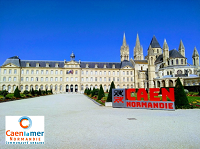Orateur
Description
Inferences of the nuclear symmetry energy from heavy-ion collisions are currently based on the comparison of measured observables and transport model simulations. Only the expectation values of observables over all considered events are used in these approaches, however, observables can be obtained event-by-event both in experiments and transport model simulations. By using the light gradient boosting machine (LightGBM), a modern machine-learning algorithm, we present a framework for inferring the density-dependent nuclear symmetry energy from observables in heavy-ion collisions on the event-by-event analysis. The ultrarelativistic quantum molecular dynamics (UrQMD) model simulations are used as training data. The symmetry energy slope parameter extracted with LightGBM event-by-event from test data also by UrQMD has an average spread of approximately 30 MeV from the truth, and is found to be robust against variations in model parameters. In addition, LightGBM can identify features that have the greatest effect on the physics of interest, thereby offering valuable insights. Our study suggests that the present framework can be a powerful tool and may offer a new paradigm to study the underlying physics in heavy-ion collisions.

